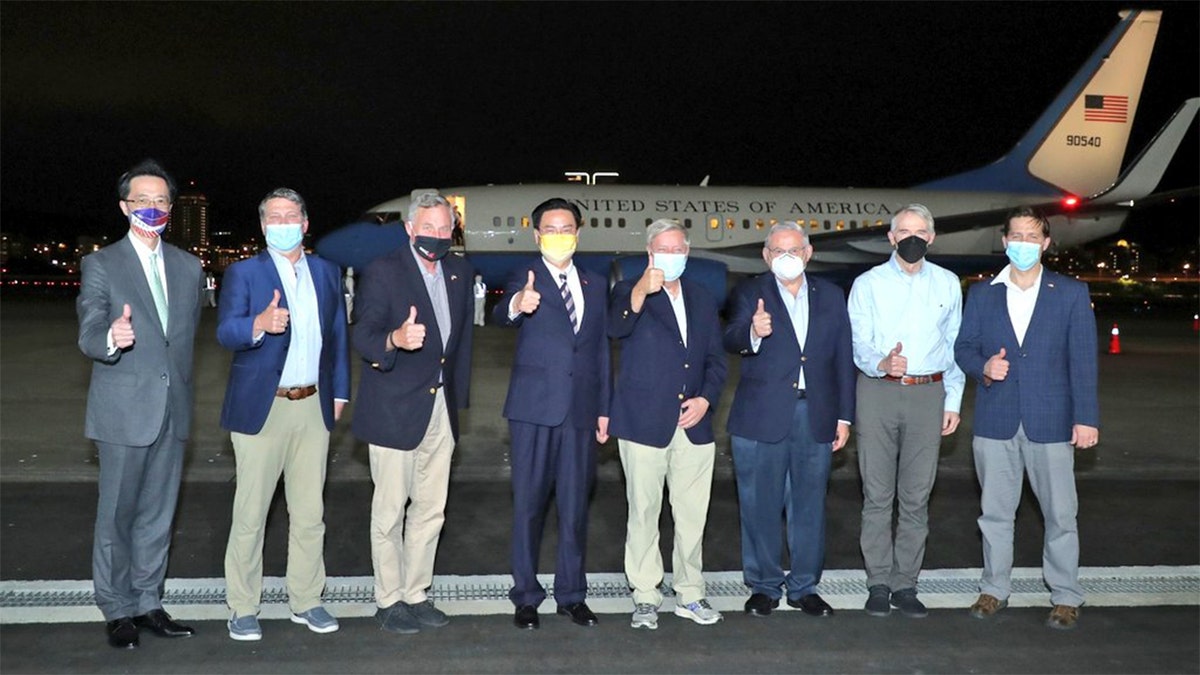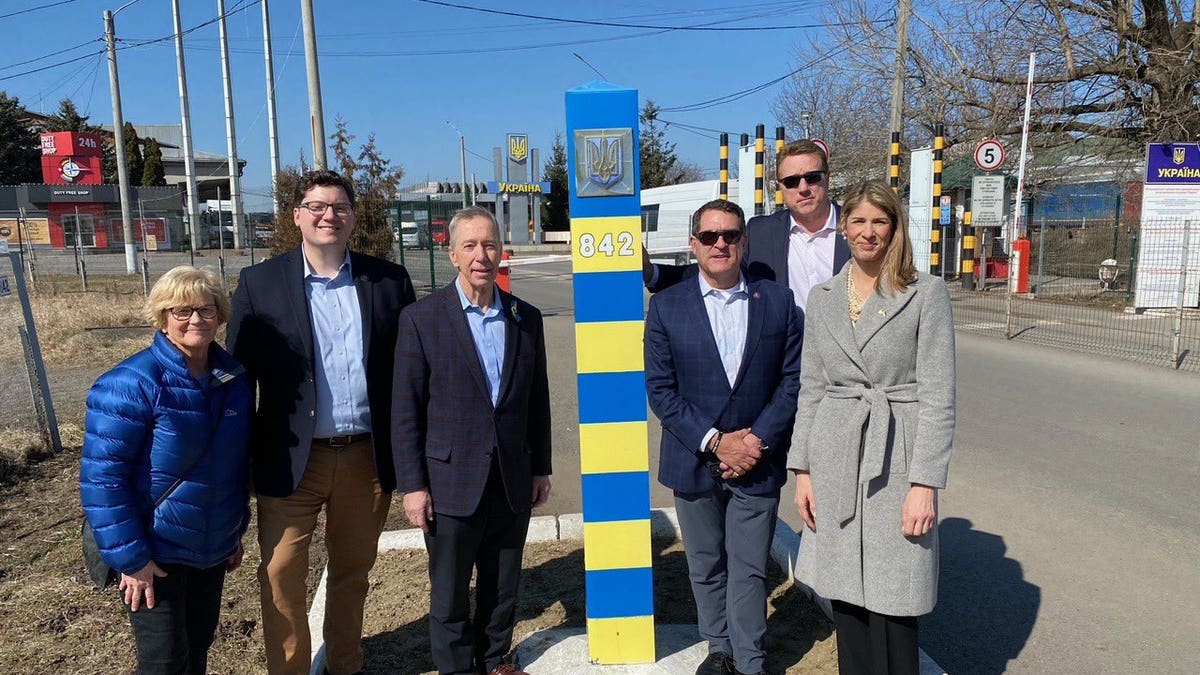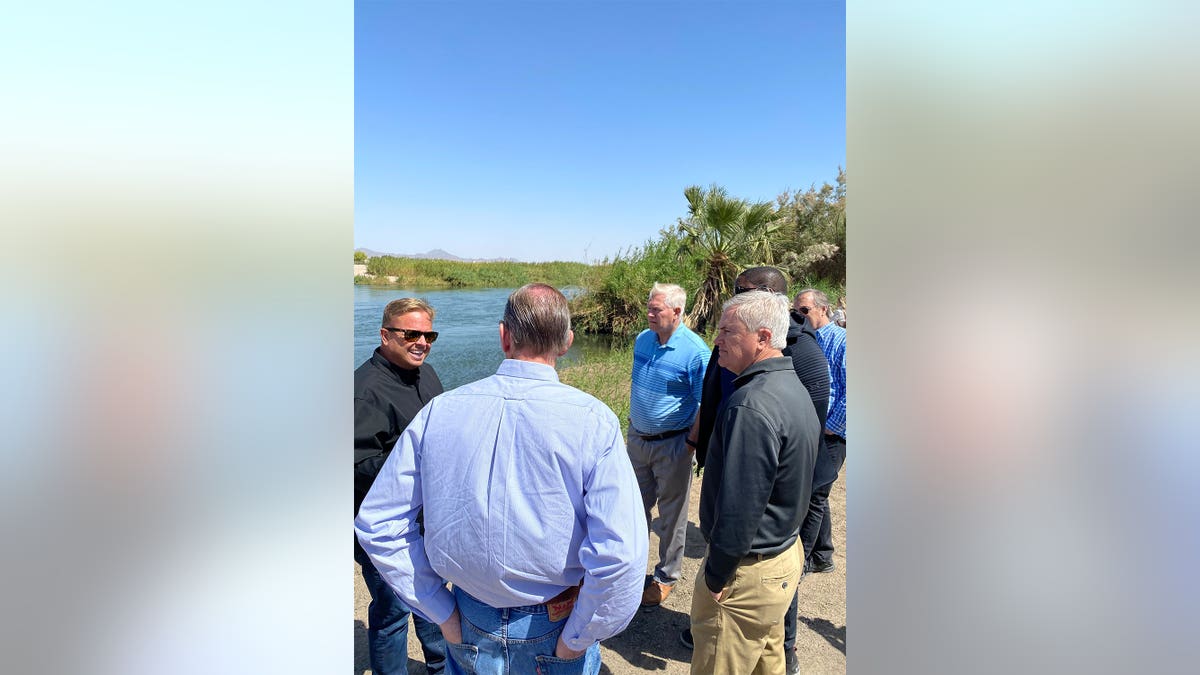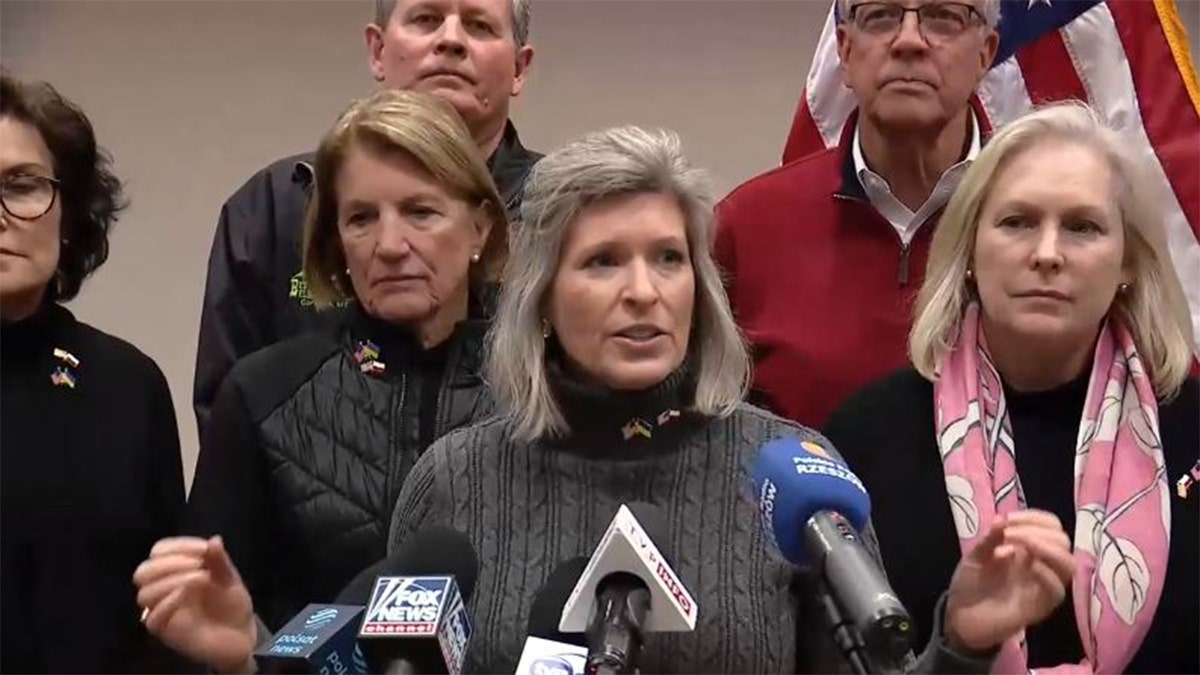Montana senator recounts recent visit to Ukraine
Sen. Steve Daines joins 'Hannity' to discuss what he saw on the ground in war-torn country.
Rep. Jason Crow, D-Colo., began a Zoom call with reporters this week with a travelogue.
"I just returned from an Intelligence Committee congressional delegation trip with three other members," said Crow. "We visited multiple locations within Poland, Slovakia and Romania."
Over the past couple of weeks, who hasn’t?
REPORTER’S NOTEBOOK: WITH CONGRESS OUT OF SESSION, LAWMAKERS’ TRAVEL DESTINATIONS SPEAK VOLUMES
The two-week Easter/Passover/Ramadan recess on Capitol Hill – coupled with an easing of the pandemic restrictions – prompted lawmakers to travel more overseas this month than they have since late 2019. These are official "congressional delegation" trips, known as "CODELs." Congressional leaders, senior members and committee chairs in both the House and Senate lead members on these trips abroad.

Sens. Lindsey Graham, Bob Menendez, Richard Burr, Rob Portman and Ben Sasse, and Rep. Ronny Jackson were greeted on their arrival to Taiwan, April 14, 2022. (Ministry of Foreign Affairs of Taiwan)
The trips are useful for fact-finding, gathering information and also escaping the "groupthink" that sometimes bedevils those who toil inside the Beltway. But do the jaunts actually fix problems or prompt policy changes?
Rep. Mark Green, R-Tenn., represents part of Fort Campbell, which sits astride the southern Kentucky/northern Tennessee border. Like Crow, Green also just returned from a trip to the Ukrainian border. The congressman says he met with a French battalion commander who is meeting with a U.S. Stryker Brigade combat team in Poland under the NATO aegis.
"I make these trips and say goodbye to my wife so that the military men and women in my community don’t have to kiss their spouses goodbye and go to war," said Green.

One congressional delegation had the opportunity to visit the Serit border crossing between Romania and Ukraine. (Rep. Pat Fallon)
In addition, Green met with U.S. military personnel in Poland.
"They were short of washing machines," said Green, who promptly messaged the Pentagon for more. "That’s just one of the unspoken or unseen things."
Taxpayers used to howl at lawmakers taking overseas "official" trips to exotic locations. The emphasis was once on the beach and pool – with a symposium or two sprinkled in to justify the affair. But that’s no longer the case.
"Congressional travel has changed dramatically in the last 30 or 40 years, in large part, because of media scrutiny that was brought on to the members of Congress who were frankly getting vacations on the taxpayer dollars," said Brad Fitch of the Congressional Management Foundation.
Fitch notes that lawmakers are worried about criticism that they’re not really working. Or worse yet, the perception that lawmakers aren’t working when they go on these trips.
Former CIA officer and Senate aide Ron Marks helped coordinate a number of CODELs for late Senate Majority Leader Bob Dole, R-Kan., and former Senate Majority Leader Trent Lott, R-Miss. Marks says there was one senator who demanded a certain amount of beach and leisure time on trips of yore.
REP. BRIAN FITZPATRICK HEADS TO UKRAINE BORDER: 'I WILL GO AS FAR AS ... THEY WILL ALLOW ME TO GO'
"There were squash games scheduled during all of this," said Marks of one particular senator. But Marks says there’s now pressure to keep an intense business program.
"You schedule from 8 in the morning until 10 at night. You don’t really have a chance to think," said Marks.
In fact, some lawmakers don’t even like to go on CODELs led by certain congressional leaders because the days are so grueling.

Reps. John Katko and James Comer were part of a recent congressional delegation to the southern border with Mexico. (House Oversight Committee Republicans)
"No sleeping, even on the plane," said one source.
"I’ve been to a couple of these myself where they had better be pouring coffee at 3 or 4 in the afternoon," said Fitch. "There’s a tedium to some of these trips that can be a little bit challenging."
But advocates of congressional travel say lawmakers can only ingest so much information from hearings or leafing through briefing dossiers.
"Sometimes just having somebody sitting there, smelling the air, hearing what’s going on on the ground, even if you’re just riding through there, give them far greater understanding than anything they’re going to get reading a newspaper or reading a briefing in Washington," said Marks. "I would rather have them going out there and at least kicking the tires a little bit than sitting back and sort of making it up like an analyst."
But Marks concedes some lawmakers do take congressional trips specifically for glorified photo-ops. To see and be seen. To make a point about a given political issue. Or maybe, even make the administration of the opposing party look bad.
"I know there are political games that get played here," said Marks. "I understand the 1,001 reasons why people show up in different places. Politicians want to get re-elected."
This is why lots of Republicans have flocked to the southern border over the past two weeks. House Minority Leader Kevin McCarthy, R-Calif., heads to Eagle Pass, Texas, in the coming days to highlight the crisis.
The Biden administration is under fire from GOPers – and members of its own party – for ending Title 42, the pandemic era policy that curbed migration. There’s concern that illegal immigration could explode at the border once the administration formally rescinds Title 42 in late May. Republicans want to make sure the public knows who is responsible. That’s why GOPers are revved up to question Homeland Security Secretary Alejandro Mayorkas at a hearing next week.
Meanwhile, vulnerable Democrats facing competitive re-election bids are also putting distance between themselves and the administration’s policy, and also drawing attention to the border. It’s good policy for those Democrats to use President Biden as a foil.
MCCARTHY, GOP DELEGATION VISITING US-MEXICO BORDER MONDAY AMID MIGRATION SURGE UNDER BIDEN
Sen. Gary Peters, D-Mich., chairs the Democratic Senatorial Campaign Committee (DSCC). That’s the formal panel charged with electing Democrats to the Senate. Peters also chairs the Senate Homeland Security and Governmental Affairs Committee. And, Peters is now part of a growing list of Senate Democrats who are bucking their party on Title 42. Peters’ decision gives other Democrats air cover to challenge the administration on the policy – and use their own president as a foil.
So expect a lot more lawmakers, from both parties, to head to the border.

Katko and Comer were part of a congressional delegation this week to the southern border with Mexico. (House Oversight Committee Republicans)
"In some of these cases, members of Congress are using (CODELs) to showcase an issue," said Fitch. "There’s no denying that some members of Congress feel there’s a symbolic value to going on a trip, whether it’s getting their picture taken with Border Patrol agents or getting their picture taken next to troops in Afghanistan or Iraq overseas."
But do the trips find solutions to big policy fights?
"They’re never going to solve the problem," said Marks. "If you’re talking about really solving problems, that gets down to people and hard bargaining across a table somewhere. Discussing budgets. Discussing laws. Discussing oversight."

Nine U.S. senators, led by Joni Ernst, R-Iowa, gave a press conference from Poland on March 19, 2022. (Fox News)
But long trips mean several things. Lots of time on airplanes. Lots of time on buses. Lots of time in hotel bars. The creation of the jet airplane made it hard for lawmakers to get to know one another in Washington. But the pandemic and the Capitol riot drove an even more stark wedge between the sides and poisoned the congressional well. Lawmakers not only couldn’t get to know one another as well because of the pandemic, but because of the riot, some had no interest in meeting members from the other side and vice versa.
But, ironically the return of CODELs could help thaw frosty congressional relations in an almost intangible, unquantifiable way.
REPORTER'S NOTEBOOK: WITH CONGRESS OUT OF SESSION, LAWMAKERS' TRAVEL DESTINATIONS SPEAK VOLUMES
"Relationships are built if you’re on a long flight from Poland back to Washington, D.C., and you’re sitting next to a member of Congress from the other party. It may be an opportunity to build lasting relationships," said Fitch. "I’ve seen legislative deals that were cut because of long congressional trips."
"Tribalism is tearing this country apart," said Green just back from Eastern Europe. "So you’re just sitting there, getting to know someone across the aisle. You’re finding out about their children. You’re finding out about their college experience. That creates relationships inside the Congress that go way beyond just the issue at hand."
So, the recent spate of travel may not end the war in Ukraine. It may not solve the border crisis. Someone may not get a brainstorm about inflation while sitting on the tarmac.
CLICK HERE TO GET THE FOX NEWS APP
Yet.
But the return to extensive congressional travel could at least break down barriers between the sides. The sides can build trust if they’re talking. And if there’s dialogue? Well, that’s probably better than what’s infected the Capitol over the past couple of years.








